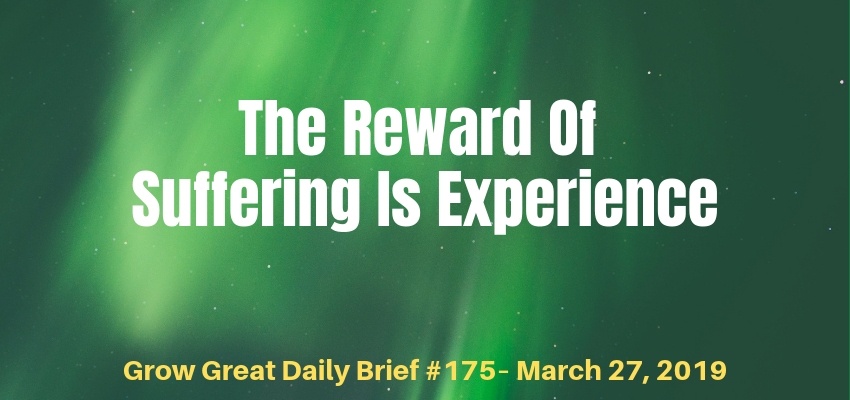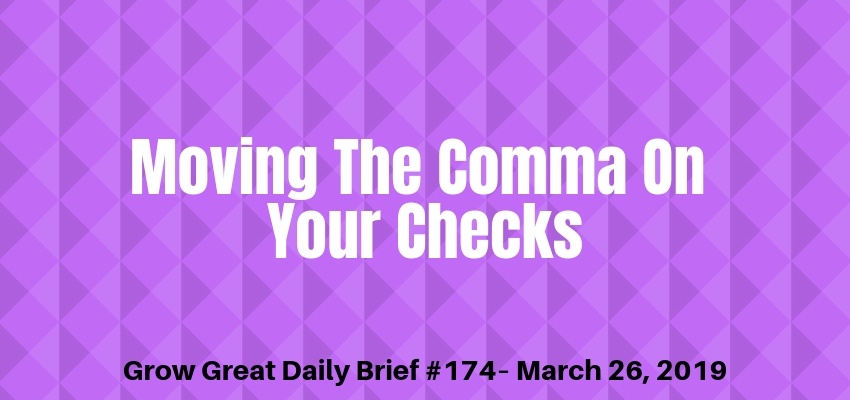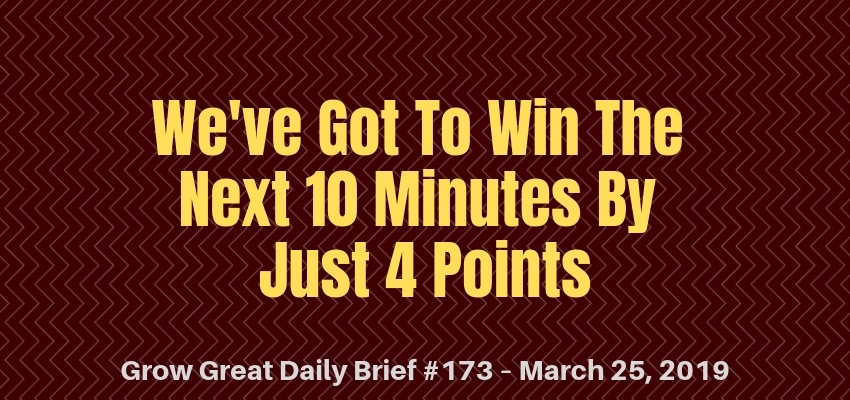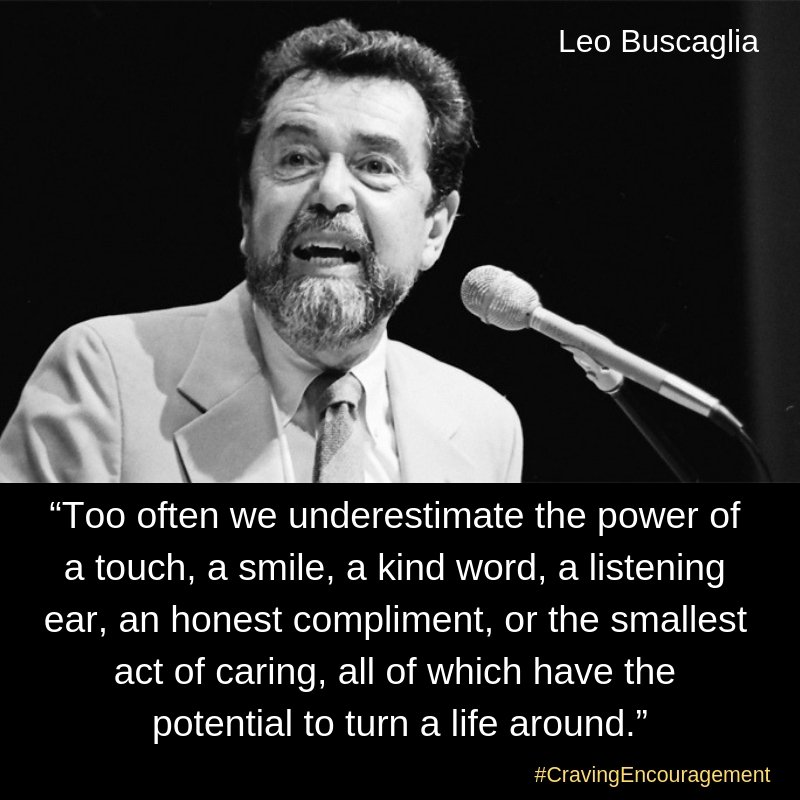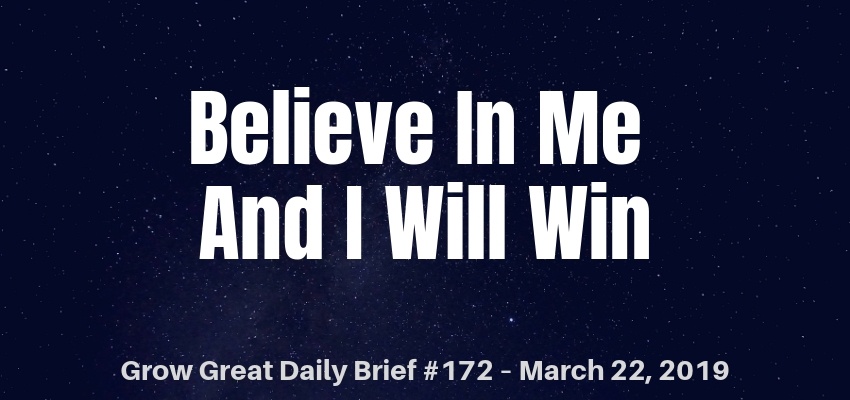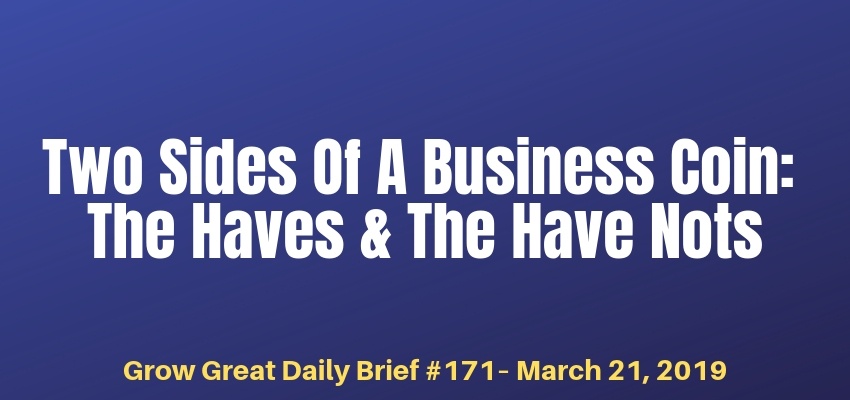Don’t Drain, Add Energy! – Grow Great Daily Brief #176 – March 28, 2019
Podcast: Play in new window | Download (Duration: 8:55 — 8.7MB)
Subscribe: Apple Podcasts | Spotify | RSS | More
Look at your life right now. Look at yourself. Look at the folks who surround you, the ones you spend the most time with.
Who do you fuel?
Who fuels you?
Who do you drain?
Who drains you?
You know the answer. We all do.
I suppose there are people in our lives who are innocuous, but we don’t spend much time around them. If we did, they would cease to be innocuous. By innocuous, I mean they’re neutral. Safe. They neither fuel nor drain. They just are.
Most of the others who surround us are one or the other. But let’s keep going with this exercise.
We’re all capable of draining energy in ourselves and in others. We’re all capable of being providers or fuelers of energy, too. I don’t imagine any of us are 100% one or the other, but one or the other dominates our character. Without being so nitpicky, start with yourself. Which are you? Pick just one that best characterizes how you see yourself. Do you drain? Or add?
Do you care which one best characterizes you? Do you care how others see you impacting their lives? Does it matter to you if people feel one way or the other about you?
Well, of course it does. At least if you have any degree of emotional intelligence and any desire to be a good influence on others!
Let’s stay with you for a moment. What is it about you that causes you to draw this conclusion about yourself? What do you DO that compels you to see yourself as a drain or as somebody who adds energy? (By the way, it’s pretty terrific if you’ve got such high self-awareness you’re able to admit you’re a drain!)
List out the things you do – the actions you take that contribute to your drain/add identity.
I’ll help get you started – and if you’re wrestling with which you may be, these may help:
Are you critical? Do you always find fault?
Do you “should” people? Or “should not” people? Do you second guess everybody thinking you know best?
Do you care more about what you think and what you have to say than listening to others? Are your ideas and opinions always best (or right)?
Do you lack curiosity about others? Are you indifferent to understanding others and why they think or feel as they do?
Do you draw conclusions with limited information?
Do you consider others valuable?
Are you interested in your growth and in helping others grow?
Do you regularly find ways where you can improve? Do you regularly look for opportunities to serve others by helping them improve?
Do you give compassion easily to others?
Are you interested in the feelings, thoughts, and opinions of others?
Are you curious about what others think?
Do you search for evidence before jumping to a conclusion about others, or about situations?
I know such things aren’t binary, but let’s look at them that way. Yes or no. Sure, we all have our days. Even jerks can have a good day where they’re kind. And the most kind among us can have a bad day where they’re jerks. But again, we mostly live our lives in a default way. I’m challenging you to figure out your default as it relates to energy – you either drain or you add. Which is it?
Now, what do you want to do about it? Anything? Maybe you don’t care. Maybe you feel how you are works, so why mess with it?
I’m going out on a limb to say you’re interested in growth and improvement. Otherwise, I don’t know why you’d even be listening to a podcast entitled, Grow Great. 😉
There are remedies for everything if we want there to be. We can fix anything in our choices and behavior if we want to. So it begins with your desires for yourself. Would you like to improve your ability to add power and energy to others? I think all those questions can help you figure it out. Do the work. It’s worthwhile.
What about the time you spend with others? Go down the list of people who surround you. Ask yourself the same questions about these people.
It may be ideal if you could jettison the drainers from your life, but unfortunately, that’s not realistic. You can reduce their impact though. It starts with giving them less time and attention. For most of us, it starts with reducing their impact on our heart. That is, we have to figure out ways to care less what these people think. Their opinions just can’t matter. Not if they’re drainers!
This is a common problem. People give too much power (energy) to the drainers. For some reason, over the course of our lives we may have gotten too close to these people. So we’ve grown to value their opinions, even though quite frequently they have toxic opinions.
Look at them for what they mostly are – a drain. Drains empty things. Drains add nothing. Ask yourself why you give so much value to the drains in your life? Figure it out and make up your mind that you’re going to plug that drain by eliminating (if you can) or greatly reducing (more likely possible) their presence in your life.
Adders (fuelers) are all too rare, but they’re out there. People who are hopeful, optimistic value adders. These people can talk with us for mere minutes and we feel like our tank is getting fuller. They just have that positive impact on us. We may not understand why, or take the time to figure that out. I’m asking you to give it the time and attention it deserves. Apply those questions to the people who surround you so you can more clearly know WHY certain people are adding energy to your life. That’s how you’ll be able to find others who can fill some spots in your life. And it’ll all help you find ways to be more like that yourself.
We all have the same time today. Our hours and minutes are what they are. How we spend those minutes is up to us. The impact we have on ourselves and others is up to us. While we might be able to be neutral, being neutral is a bad thing. It means our presence in somebody’s life doesn’t matter. That’s almost never the case.
Instead, we’re either draining energy from others or we’re adding it. It’s up to us to decide, then to take the proper action so we’re fueling ourselves and others. As often as possible. As consistently as possible.
Be well. Do good. Grow great!
RC
Don’t Drain, Add Energy! – Grow Great Daily Brief #176 – March 28, 2019 Read More »

